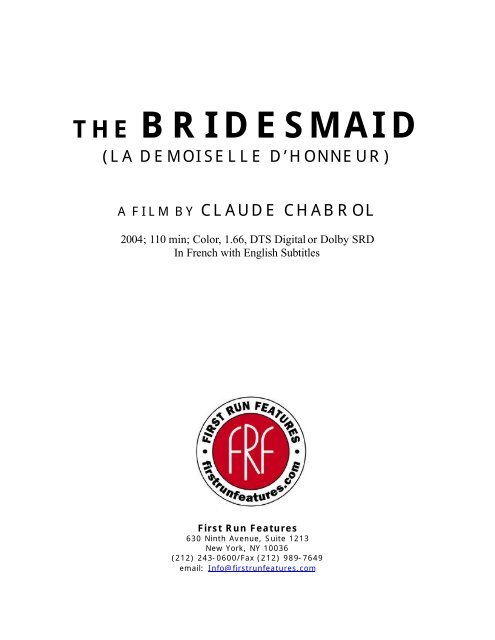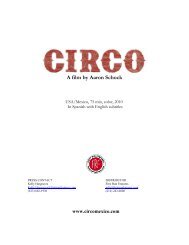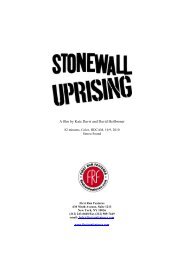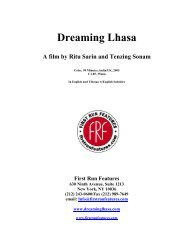Bridesmaid Press Kit - First Run Features
Bridesmaid Press Kit - First Run Features
Bridesmaid Press Kit - First Run Features
You also want an ePaper? Increase the reach of your titles
YUMPU automatically turns print PDFs into web optimized ePapers that Google loves.
THE BRIDESMAID<br />
(LA DEMOISELLE D’HONNEUR)<br />
A FILM BY CLAUDE CHABROL<br />
2004; 110 min; Color, 1.66, DTS Digital or Dolby SRD<br />
In French with English Subtitles<br />
<strong>First</strong> <strong>Run</strong> <strong>Features</strong><br />
630 Ninth Avenue, Suite 1213<br />
New York, NY 10036<br />
(212) 243-0600/Fax (212) 989-7649<br />
email: Info@firstrunfeatures.com
www.firstrunfeatures.com<br />
Screenplay and dialogue by Pierre Leccia and Claude Chabrol adapted from the novel by Ruth Rendell<br />
Aurore Clément, with the participation of Bernard Le Coq and Michel Duchaussoy, Suzanne Flon, Solène<br />
Bouton, Anna Mihalcea, Eric Seigne, Pierre-Francois Dumeniaud, Philippe Duclos,Thomas Chabrol<br />
Produced by Patrick Godeau - Antonio Passalia - Alfred Hürmer A French-German co-production<br />
ALICELEO - CANAL DIFFUSION - FRANCE 2 CINEMA - INTEGRAL FILM<br />
SYNOPSIS<br />
Handsome young Philippe, still living at home with his mother and two sisters, has a promising career<br />
ahead of him. At the wedding of his sister Sophie he meets her stunning but strangely aloof bridesmaid,<br />
Senta, and it is love at first sight. But Senta’s life and past is shrouded in mystery, and she tells him stories<br />
about herself that seem unbelievable. Then she declares that as proof of their love to each other, each of<br />
them should kill a total stranger. But is this just another of Senta’s wild stories? And how far is Philippe<br />
willing to go, even as his love for her seems to know no limits?<br />
CAST<br />
BENOIT MAGIMEL Philippe<br />
LAURA SMET Senta<br />
AURORE CLEMENT Christine<br />
BERNARD LE COQ Gérard<br />
SOLENE BOUTON Sophie<br />
ANNA MIHALCEA Patricia<br />
MICHEL DUCHAUSSOY The Tramp<br />
SUZANNE FLON Mrs. Crespin<br />
ERIC SEIGNE Jacky<br />
PIERRE-FRANCOIS DUMENIAUD Nadeau<br />
PHILIPPE DUCLOS Captain<br />
THOMAS CHABROL Lieutenant Laval<br />
CREW<br />
A FILM BY Claude Chabrol<br />
SCREENPLAY & DIALOGUE Pierre Leccia and Claude Chabrol<br />
FROM THE NOVEL BY Ruth Rendell<br />
ORIGINAL SCORE Matthieu Chabrol<br />
Orchestra conducted by Laurent Petitgirard<br />
DIRECTOR OF PHOTOGRAPHY Eduardo Serra (AFC-ASC)<br />
CAMERA OPERATOR Michel Thiriet<br />
FILM EDITOR Monique Fardoulis<br />
SOUND Pierre Lenoir, Thierry Lebon<br />
PRODUCTION DESIGNER Françoise Benoît-Fresco<br />
COSTUME DESIGNER Mic Cheminal<br />
SCRIPT SUPERVISOR Aurore Chabrol<br />
1ST ASSISTANT DIRECTOR Cécile Maistre<br />
PRODUCTION MANAGER Michel Jullien<br />
LINE PRODUCER Françoise Galfrè<br />
PRODUCERS Antonio Passalia, Patrick Godeau, Alfred Hürmer
A French-German coproduction ALICELEO – CANAL DIFFUSION – FRANCE 2 CINEMA<br />
– INTEGRAL FILM in association with COFIMAGE 15 with the support of the Région des<br />
Pays de Loire and of the Ministère de la Culture et de la Communication (CNC) with the<br />
participation of FilmFernsehFond Bayern, Filmförderungsanstalt, Titania Produzioni and Janus<br />
International and with the participation of CANAL+ and CINECINEMA<br />
<strong>Run</strong>ning time: 110’ / 1.66 – DTS Digital – Colour<br />
CLAUDECHABROL<br />
For a director whose 1958 debut, Le Beau Serge, is universally recognized as launching the French New<br />
Wave a year before Truffaut’s The 400 Blows took Cannes by storm, Claude Chabrol is an exquisitely<br />
understated filmmaker. Whether exploring a convoluted ménage à trios in Les Biches (1968) or having a<br />
vengeful postmistress and an illiterate servant blow away a bourgeois family in A Judgment in Stone<br />
(1995), he never takes the audience for granted. Instead, he concentrates on perfectly pitched plots and an<br />
unparalleled sense of human psychology to rivet spectators to their seats, refusing to let go until he has<br />
inexorably squeezed the last drop of blood or passion from the on-screen situations he consummately<br />
choreographs. Chabrol’s mastery of the thriller genre, as well as his rotund physique, has led to inevitable<br />
comparisons with Alfred Hitchcock. It is a comparison that the director insists, “is neither entirely fair, nor<br />
entirely false”. But unlike Hitch, and very much like the fine wines he tastes with undiluted pleasure,<br />
Chabrol improves with age. After his critically and commercially acclaimed early years, and his wilderness<br />
decade in the 1980s, Chabrol burst back onto the scene with a string of hits in the last ten years - Madame<br />
Bovary, Betty, Hell, A Judgment in Stone, Nightcap - that brought awards at festivals and packed houses in<br />
theatres. The common thread of those pictures was a number of strong, alluring roles for some of France’s<br />
best actresses, Emmanuelle Béart, Sandrine Bonnaire and Isabelle Huppert. Now with The <strong>Bridesmaid</strong>,<br />
adapted from Ruth Rendell’s novel, the director has brought together two brilliant young actors, Benoît<br />
Magimel and Laura Smet, to tell a tangled, edgy tale of twisted passion reminiscent of his most<br />
accomplished films noirs.<br />
CLAUDECHABROL Filmography<br />
2004 La demoiselle d’honneur - The <strong>Bridesmaid</strong> - La damigella d’onore<br />
2003 La fleur du mal - The Flower of Evil - Il fiore del male<br />
1999 Merci pour le chocolat - Nightcap - Grazie per la cioccolata<br />
1998 La couleur du mensonge - The Colour of Lies - Il colore della menzogna<br />
1996 Rien ne va plus - The Swindle<br />
1995 La cérémonie - A Judgement in Stone - Il buio nella mente<br />
1994 L’enfer - Hell - L’inferno<br />
1993 L’œil de Vichy - The Eye of Vichy<br />
1992 Betty<br />
1991 Madame Bovary<br />
1990 Docteur M<br />
Jours tranquilles à Clichy - Quiet Days in Clichy - Giorni felici a Clichy<br />
1988 Une affaire de femmes - Story of Women - Un affare di donne<br />
1987 Le cri du hibou - The Cry of the Owl - Il grido del gufo<br />
1986 Masques - Masks - Volto segreto<br />
1985 L’inspecteur Lavardin - Inspector Lavardin - L’ispettore Lavardin<br />
1984 Poulet au vinaigre - Cop au Vin - Una morte di troppo<br />
1983 Le sang des autres - The Blood of Others - Il sangue degli altri<br />
1982 Les fantômes du chapelier - The Hatter’s Ghosts - I fantasmi del cappellaio<br />
1980 Le cheval d’orgueil - The Horse of Pride<br />
1977 Violette Nozière - Violette<br />
1976 Alice ou la dernière fugue - Alice<br />
1975 Folies bourgeoises - The Twist - Pazzi borghesi
Les magiciens - Death Rite - Profezia di un delitto<br />
1974 Les innocents aux mains sales<br />
Innocents with Dirty Hands - Gli innocenti dalle mani sporche<br />
Une partie de plaisir - Piece of Pleasure - Una gita di piacere<br />
1973 Nada - The Nada Gang - Sterminate “Gruppo Zero”<br />
1972 Les noces rouges - Wedding in Blood - L’amico di famiglia - Le nozze rosse<br />
Docteur Popaul - Dr Popaul - Trappola per un lupo<br />
1971 La décade prodigieuse - Ten Days Wonder - Dieci incredibili giorni<br />
1970 Juste avant la nuit - Just Before Nightfall - Sul far della notte<br />
La rupture - The Break-Up - All’ombra del delitto<br />
1969 Le boucher - The Butcher - Il tagliagole<br />
Que la bête meure - The Beast Must Die - Ucciderò un uomo<br />
1968 La femme infidèle - The Unfaithful Wife - Stéphane, una moglie infedele<br />
1967 Les biches - Bad Girls - Le cerbiatte<br />
La route de Corinthe - The Road to Corinth - Criminal Story<br />
1966 Le scandale - The Champagne Murders - Lo scandalo<br />
La ligne de démarcation - Line of Demarcation - La linea di demarcazione<br />
1965 Le tigre se parfume à la dynamite<br />
An Orchid for the Tiger - La tigre profumata alla dinamite<br />
Marie-Chantal contre le docteur Kha<br />
Marie-Chantal vs Doctor Kha - Marie-Chantal contro il dottor Kha<br />
1964 Le tigre aime la chair fraîche<br />
The Tiger Likes Fresh Blood - La tigre ama la carne fresca<br />
1963 Les plus belles escroqueries du siècle<br />
The Beautiful Swindlers - Le più belle truffe del mondo<br />
1962 Landru - Bluebeard<br />
1961 Ophélia - Ofelia<br />
Les sept péchés capitaux - The Seven Capital Sins - I sette peccati capitali<br />
1960 Les godelureaux - Wise Guys - I bellimbusti<br />
1959 Les bonnes femmes - The Good Girls - Le donne facili<br />
A double tour - Web of Passion - A doppia mandata<br />
1958 Les cousins - The Cousins - I cugini<br />
Le beau Serge - Handsome Serge<br />
An Interview with CLAUDE CHABROL<br />
Your thrillers are always totally distinctive. How do you explain that?<br />
Generally, in thrillers, it’s the plot that keeps things moving. In my films, that’s not the case. It’s more what<br />
we learn about the characters. In the final analysis, the plot is not terribly significant. I try to get it out of<br />
the way in the first reel.<br />
Nonetheless, there’s still a resolution at the end.<br />
Of course, but my hope is that the audience will forget everything they hear about a girl going missing in<br />
the next fifteen minutes of the movie. I really want to get the audience involved, get them to identify with<br />
Benoit’s character so that, when he makes his decision at the end —and it’s a truly crazy decision — the<br />
audience isn’t shocked. So that they might think, “hey, after all, why not?” When in fact what he decides is<br />
absolutely inconceivable.<br />
What interested you particularly in the psychology of the characters of Ruth Rendell’s novel?<br />
Very often, when you are dealing with the relationship between passion and reason, it’s passion that wins<br />
out but you regret it, thinking: “Oh, poor so-and-so, he’s really being taken for a ride.” Here, I don’t want<br />
that to happen. The film ends with Philippe’s irrevocable decision to plunge into the abyss and I’d like<br />
audiences to say, “If that were me, maybe I’d do the same...”<br />
Was it a deliberate choice to film a more passionate, sensual story than your more recent movies?<br />
You can’t always deal with the same issues. Like it or not, passion expresses itself through sex, for a time<br />
at least.We need to show the attraction Philippe feels, 80% of which is down to sex and only 20% the result
of the need to fill a yawning gap in his life, an absence of dreams. If the girl had no sex-appeal, it wouldn’t<br />
work. He’d think it through. In this instance, he puts his mind on hold.<br />
How did you describe the character to Benoît Magimel?<br />
If the actor needs me to explain what I want and what it all means, it probably means I chose the wrong<br />
actor! I sent Benoît the script and asked him if he was interested. He replied that he liked it a lot and he<br />
talked about it very intelligently.Then, we had to put back shooting a couple of times and each time Benoît<br />
made sure he was available.<br />
Why did you choose him to play Philippe?<br />
There are few actors who are — as opposed to those who can act or pretend to be — uptight and awaiting<br />
release at the same time, like being locked up with the door wide open. Benoît’s like that in real life. I give<br />
him his head for a couple of rehearsals to see what he comes up with, what he draws out of himself because<br />
it’s quite close to him. I found him terrifically convincing in Michael Haneke’s The Piano Teacher, but then<br />
he was very convincing in a lot of other films as well. After The Piano Teacher, when I told her that I<br />
wanted to make a film with Benoît, Isabelle Huppert said to me “Yes, he’s amazing, nothing like other<br />
young actors.” I have a lot of faith in Isabelle’s opinion on that score.<br />
Like your films, Ruth Rendell’s novels place more emphasis on psychology than mystery and<br />
suspense...<br />
Definitely. She knows what goes through people’s minds. At the same time, what’s pretty unusual is that<br />
she captures the impact of their social background, the way they earn a living, where they live and so on.<br />
All that can be totally fascinating, but there are very few thriller writers who are aware of it.<br />
What appeals to you most in the genre?<br />
There has to be a corpse. It grabs people’s attention. They like a good corpse. There are some tremendous<br />
books where there isn’t a corpse, but I always think after the first fifty pages, “Is this going to interest me?”<br />
When I read a book and there’s a corpse, I always think that, whatever happens, it won’t have been a<br />
complete waste of time.<br />
How did you set about adapting the novel?<br />
I worked on the script with Pierre Leccia, who had done an excellent job of adapting another of Ruth<br />
Rendell’s books. Usually, when I write, I’m the one who keeps the plot nice and tight and I let my cowriters<br />
concentrate on the psychological subtleties. In this instance, the plot was already nice and tight so I<br />
could just have fun picking up on the<br />
little things, which I don’t usually get the chance to do.<br />
Did you make any significant changes?<br />
Yes, there was an idea that came to me at the last minute. It was very gratifying because I sent the script to<br />
Ruth Rendell and she replied that she was very pleased with it. I hope she wasn’t just being polite! She<br />
especially liked the idea I had, which was for the <strong>Bridesmaid</strong>’s dress to be cleaned and returned to Senta,<br />
who uses it for a purpose<br />
I can’t tell you about without letting the whole thing out of the bag, but it was a genuinely good idea.<br />
How did you come to cast Laura Smet to play Senta?<br />
I had done some screen tests with her for a part in my previous movie and she was just as good as Melanie<br />
Doutey but Melanie was more what I was looking for physically. I said to myself back then, “As soon as I<br />
get the chance, I’m going to work with Laura”. So, this time I didn’t even do any tests. I knew she would<br />
be terrific.<br />
What do you like about her?<br />
<strong>First</strong> of all, she’s spot-on in everything she does. At the same time, there’s this kind of off-the-wall touch<br />
that Laura has quite naturally, that you can’t act. When she says, “Take me to the sea,” it’s very unsettling.<br />
But it’s natural. I like it when actors aren’t too different from the character they are playing.<br />
Senta has a very special, unnerving presence...<br />
She skews reality. Reality is still there but it is skewed. That’s the founding principle of witchcraft. I like it<br />
when the horror creeps up on you. To that extent, the sets contribute to an understanding of the character. If<br />
a character’s very square, they’ll live in a house that’s very square not wild and crazy.The same goes for<br />
Senta. What is unnerving is that there is a sense of decay about her apartment but we don’t know, yet,<br />
where it comes from.<br />
Would you say that killing is the ultimate anarchy?<br />
The trouble is that killing is a bit more serious than anarchy. That’s a real problem. There is no more<br />
anarchy because it’s true that killing someone now is the only means of rebellion but it is an inexcusable<br />
rebellion. It would be good for people to rebel more but they need to find other ways.
You said once that you’re not pessimistic about people but about their lives.<br />
Yes, I find that they’re sailing by the wrong landmarks. People attach great importance to things that have<br />
none or less than they think. I was particularly struck by the onslaught there was recently on happiness.<br />
Several books came out proclaiming happiness to be total crap. That made me laugh because you can<br />
always find people who think that but<br />
they don’t all write books at the same time. Anyway, there were debates and discussions and people<br />
eventually said, “Actually, happiness isn’t total crap after all.”<br />
Do you think of the audience when you are shooting?<br />
I try not to make things any harder for them.There are some terrifying films, which propose empty or<br />
idiotic solutions to people’s problems. All the Schwarzenegger-type solutions are bad ones. I’m not talking<br />
about the Schwarzy the governor but Schwarzy the actor. It’s very, very wrong. It leads to guys like Bush,<br />
who don’t have a single rational thought in their heads. Their thoughts seem rational but they’re out of<br />
touch with reality.<br />
The film opens with what seems like a united family going out together and ends with the whole<br />
family being questioned at the police station.<br />
At the beginning of the movie, all the members of the family, except for Philippe who doesn’t realize it, are<br />
trying to escape or flee in one way or another. Even Christine, the mother, wants to go off and live with her<br />
boyfriend. Philippe’s little sister is obsessed with getting away from home and his other sister marries an<br />
unlikely fireman. It’s scary,<br />
a regular family scattered to the winds ahead of its time.<br />
You never project a particularly attractive image of family life.<br />
The family is one of the biggest frauds ever invented. As much as it is a tremendous concept, when it<br />
becomes an obligatory social structure, it’s atrocious. Right now, things are very interesting because people<br />
talk a lot about the breakdown of the nuclear family but instead of using real feelings as a starting point,<br />
they use a kind of charter of<br />
obligations. The traditional idea of the family is an abomination. The family tree is a monstrous invention.<br />
People boasting of one of their ancestors being the Pope’s official mustard-supplier! It’s pathetic!<br />
At the end of the film, with police sirens wailing all around outside, do you intend for there to be an<br />
element of ambiguity, for the audience to be unsure what has happened?<br />
We know. We know full well but we don’t want to admit it. That’s what I like because it reaches the point<br />
where audiences ask themselves if they would be strong enough, or crazy enough, to reject their whole<br />
mental make-up. If they come out asking themselves that, I will be very happy.<br />
Is it possible to rein in one’s craziness?<br />
There is a great temptation to know what a certain form of perversity is like. It’s very devious, but it was<br />
there in the book. Senta’s list of “must-do’s” is very sneaky. Making love with somebody of the same sex is<br />
what seems the most shocking, except for killing a complete stranger, of course. In fact, the idea that you<br />
must kill a complete stranger to<br />
prove your love makes the whole thing more palatable, a kind of joke. Planting a tree is a hard one...<br />
You are often compared to Hitchcock. Did you think of Psycho when you were writing the movie?<br />
I can see it now. Depending on people’s tastes, it’s going to be “brings to mind Psycho” or “nowhere near<br />
as good as Psycho”. One or the other.<br />
Does the comparison irritate you?<br />
It doesn’t irritate me and it doesn’t please me. It’s not entirely true, nor is it entirely false, but it’s not true<br />
in the sense that most people think. There is an inaccurate analysis of the situation. Even so, I prefer people<br />
to say that it reminds them of Hitchcock but that it’s not as good than for them to say that it reminds them<br />
of a film by Alan Smithee.
An Interview with BENOIT MAGIMEL<br />
How would you describe your character in The <strong>Bridesmaid</strong>?<br />
Philippe is a guy with a major sense of responsibility, who carries a big burden on his shoulders.Within the<br />
family, he’s the son, brother, husband and he plays the paternal role as well. He has a fairly ambiguous<br />
relationship with his mother, as often happens in single-parent families. He accepts his life without<br />
rebelling. He has given up on all his ambitions, desires and ideals because he never really had the choice.<br />
And then he meets Senta...<br />
It’s not love at first sight. It’s more like something that was meant to be. When they meet, it’s as if they’ve<br />
known each other forever even though they’re so different. She’s mysterious and intriguing, and I think it<br />
amuses Philippe that she should be everything he isn’t. He comes out of his shell thanks to her and he<br />
discovers love, which is fabulous. The first time they make love, it’s as if it’s so natural. There’s no frantic<br />
fumbling or mawkish romanticism. It’s very understated and enigmatic. Philippe is unsettled by her wild<br />
side, by the way she constantly idealizes their relationship. The amazing thing is that you get the<br />
impression that she’s lying the whole time when in fact she’s telling the truth. But he only realizes that at<br />
the end. He thinks she’s crazy but he’s in love with her.<br />
What appealed to you when you read the script?<br />
In Claude’s movies, women have the strongest roles. The men are often victims. The women decide. There<br />
were so many levels to it that I had to re -read the script several times to grasp everything. There’s the<br />
family element. There are dark secrets. The characters get drawn in, even if they refuse to face the truth.<br />
From the moment Philippe decides to play on Senta’s terms, he is flirting with danger. He is attracted to her<br />
and becomes an accomplice, to some extent, in what she does. But that doesn’t stop him going for it and I<br />
think that’s wonderful. The last scene is very beautiful in that respect.<br />
Would you say it’s a typical Chabrol movie?<br />
There are a lot of love scenes, which is a change from his more recent movies. A lot of the themes are the<br />
same but they’re impregnated with love and sensuality. There’s a special something that is linked to<br />
Chabrol’s world view. His films always come at you from a different angle. Even before Philippe meets<br />
Senta there’s something eerie, something not quite right. You might even think that Philippe is a potential<br />
killer. There’s a hint of craziness under the surface. When you read one of Claude’s scripts, everything<br />
seems very normal but then you get to act it out and all these tiny details build a strange sense of mystery.<br />
You seem to like working several times with the same director.<br />
It’s easier working with someone for the second time. It all comes down to a question of trust. Claude goes<br />
straight to the point. Every scene serves a precise purpose. There’s no need to underscore things to bring<br />
out hidden meanings, everything is already there. He doesn’t like talking about the characters for hours. It<br />
all becomes clear as soon as you get on set. Even so, I found that he was more present on this film.<br />
Probably because it’s less of a showcase movie. It’s more intimate, closer to him. Chabrol is like a guy with<br />
a big bunch of keys. When you can’t find the solution, he comes over and gives you the key that unlocks<br />
the door.<br />
Philippe is reminiscent of Walther Klemme r, the young lover in Haneke’s The Piano<br />
Teacher, for which you won Best Actor at Cannes.<br />
I think that the two characters are very much alike in their sincerity and emotional honesty. Philippe<br />
honestly loves Senta. The fact that he becomes her accomplice is a huge proof of his love. Like Walther,<br />
he’s not a calculating guy. There’s something very wholesome in the way he loves her and gives himself up<br />
to her body and soul.<br />
After that movie, you received offers of work from all over the world, including Hollywood.<br />
Were you tempted?<br />
I realized that for me the most important thing is the director. If the director is right, the story and the<br />
characters soon fit into place. Sometimes you’ll read a good script and want to do it even if you sense the<br />
director’s not right for the film. It’s vital for an actor to venture beyond his own little world but the director<br />
and the part have to be right.<br />
You started out in movies at the age of 12. Did you ever doubt that it was what you wanted<br />
to do?<br />
When you’ve had a taste of the cinema, you never want to try anything else. After that first experience on a<br />
movie set, it’s difficult to give it up. The cinema is magical.
BENOIT MAGIMEL Selected Filmography<br />
2004 Selon Charlie by/di Nicole Garcia<br />
Les chevaliers du ciel by/di Gérard Pirès<br />
La demoiselle d’honneur - The <strong>Bridesmaid</strong> - La damigella d’onore by/di Claude Chabrol<br />
2003 Trouble by/di Harry Cleven<br />
Les rivières pourpres 2 : les anges de l’apocalypse<br />
Crimson Rivers 2: Angels of the Apocalypse - I fiumi di porpora 2: gli angeli dell’Apocalisse by/di Olivier<br />
Dahan<br />
2002 Effroyables jardins - Strange Gardens by/di Jean Becker<br />
La fleur du mal - The Flower of Evil - Il fiore del male by/di Claude Chabrol<br />
2001 Nid de guêpes - The Nest - Nido di vespe by/di Florent Emilio Siri<br />
2000 La pi aniste - The Piano Teacher - La pianista by/di Michael Haneke<br />
1998 Les enfants du siècle - The Children of the Century by/di Diane Kurys<br />
1997 Déjà mort - Already Dead by/di Olivier Dahan<br />
1995 Les voleurs - The Thieves by/di André Téchiné<br />
1994 La haine - Hate - L’odio by/di Mathieu Kassovitz<br />
1991 Toutes peines confondues by/di Michel Deville<br />
1987 La vie est un long fleuve tranquille - Life Is A Long Quiet River - La vita è un lungo fiume<br />
tranquillo by/di Etienne Chatilliez<br />
LAURA S M E T Filmography<br />
2004 La demoiselle d’honneur - The <strong>Bridesmaid</strong> - La damigella d’onore by/di Claude Chabrol<br />
2003 La femme de Gilles by/di Frédéric Fonteyne<br />
2002 Les corps impatients - Eager Bodies - Corpi impazienti by/di Xavier Giannoli







